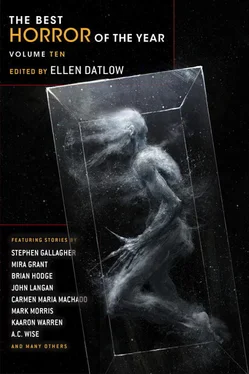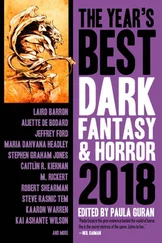Каарон Уоррен - The Best Horror of the Year Volume Ten
Здесь есть возможность читать онлайн «Каарон Уоррен - The Best Horror of the Year Volume Ten» весь текст электронной книги совершенно бесплатно (целиком полную версию без сокращений). В некоторых случаях можно слушать аудио, скачать через торрент в формате fb2 и присутствует краткое содержание. Город: New York, Год выпуска: 2018, ISBN: 2018, Издательство: Night Shade Books, Жанр: Ужасы и Мистика, на английском языке. Описание произведения, (предисловие) а так же отзывы посетителей доступны на портале библиотеки ЛибКат.
- Название:The Best Horror of the Year Volume Ten
- Автор:
- Издательство:Night Shade Books
- Жанр:
- Год:2018
- Город:New York
- ISBN:978-1-5107-1667-4
- Рейтинг книги:4 / 5. Голосов: 1
-
Избранное:Добавить в избранное
- Отзывы:
-
Ваша оценка:
- 80
- 1
- 2
- 3
- 4
- 5
The Best Horror of the Year Volume Ten: краткое содержание, описание и аннотация
Предлагаем к чтению аннотацию, описание, краткое содержание или предисловие (зависит от того, что написал сам автор книги «The Best Horror of the Year Volume Ten»). Если вы не нашли необходимую информацию о книге — напишите в комментариях, мы постараемся отыскать её.
The Best Horror of the Year Volume Ten — читать онлайн бесплатно полную книгу (весь текст) целиком
Ниже представлен текст книги, разбитый по страницам. Система сохранения места последней прочитанной страницы, позволяет с удобством читать онлайн бесплатно книгу «The Best Horror of the Year Volume Ten», без необходимости каждый раз заново искать на чём Вы остановились. Поставьте закладку, и сможете в любой момент перейти на страницу, на которой закончили чтение.
Интервал:
Закладка:
Night had all but fallen when I emerged. As I washed my hands before going to make a last check on our dying shepherd, I reflected on the custom of slipping a stillbirth into a coffin to share a stranger’s funeral. On the one hand, it could seem like a heartless practice; on the other, there was something touching about the idea of a nameless child being placed in the anonymous care of another soul. Whenever I try to imagine eternity, it’s always long and lonely. Such company might be a comfort for both.
John Petrie lay with his face toward the darkened window. In the time since my first visit he’d been washed and fed, and the bed remade around him.
I said, “Mister Petrie, do you remember me? Doctor Spence.”
There was a slight change in the rhythm of his breathing that I took for a yes.
I said, “Are you comfortable?”
Nothing moved but his eyes. Looking at me, then back to the window.
“What about pain? Have you any pain? I can help with it if you have.”
Nothing. So then I said, “Let me close these blinds for you,” but as I moved, he made a sound.
“Don’t close them?” I said. “Are you sure?”
I followed his gaze.
I could see the shelter mound from here. Only the vague shape of the hill was visible at this hour, one layer of deepening darkness over another. Against the sky, in the last of the fading light, I could make out the outline of an animal. It was a dog, and it seemed to be watching the building.
I did as John Petrie wished, left the blinds open, and him to the night.
My accommodation was in the wooden barracks where the prisoners had lived and slept. I had an oil lamp for light and a ratty curtain at the window. My bags had been lined up at the end of a creaky bunk. The one concession to luxury was a rag rug on the floor.
I could unpack in the morning. I undressed, dropped onto the bed, and had the best sleep of my life.

With the morning came my first taste of practice routine. An early ward round, such as it was, and then a drive down into town for weekday Surgery. This took place in a room attached to the Library and ran on a system of first come, first served, for as long as it took to deal with the queue. All went without much of a hitch. No doubt some people stayed away out of wariness over a new doctor. Others had discovered minor ailments with which to justify their curiosity. Before Surgery was over, Rosie Kirkwood joined me fresh from the boat. Doctor Laughton had not enjoyed the voyage, she told me, and we left it at that.
After the last patient (chilblains) had left, Nurse Kirkwood said, “I see you have use of Doctor Laughton’s car. Can I beg a lift back to the hospital?”
“You can,” I said. “And along the way, can you show me where the Tullochs live? I’d like to drop by.”
“I can show you the way,” she said. “But it’s not the kind of place you can just ‘drop by.’”
I will not claim that I’d mastered the Riley. When I described it as clapped-out, I did not exaggerate. The engine sounded like a keg of bolts rolling down a hill and the springs gave us a ride like a condemned fairground. Rosie seemed used to it.
Passing through town with the harbour behind us, I said, “Which one’s the undertaker?”
“We just passed it.”
“The furniture place?”
“Donald Budge. My father’s cousin. Also the Coroner and cabinet maker to the island.”
Two minutes later, we were out of town. It was bleak, rolling lowland moor in every direction, stretching out to a big, big sky.
Raising my voice to be heard over the whistling crack in the windshield, I said, “You’ve lived here all your life?”
“I have,” she said. “I saw everything change with the war. We thought it would go back to being the same again after. But that doesn’t happen, does it?”
“Never in the way you expect,” I said.
“Doctor Laughton won’t be coming back, will he?”
“There’s always hope.”
“That’s what we say to patients.”
I took my eyes off the road for a moment to look at her.
She said, “You can speak plainly to me, Doctor. I don’t do my nursing for a hobby. And I don’t always plan to be doing it here.” And then, with barely a change in tone, “There’s a junction with a telephone box coming up.”
I quickly returned my attention to the way ahead. “Do I turn?”
“Not there. The next track just after.”
It was a rough track, and the word boneshaking wouldn’t begin to describe it. Now I understood why the Riley was falling apart, if this was the pattern for every home visit. The track ran for most of a mile and finally became completely impassable, with still a couple of hundred yards to go to reach the Tullochs’ home.
Their house was a one-storey crofter’s cottage with a sod roof and a barn attached. The cottage walls were lime washed, those of the barn were of bare stone. I took my medical bag from the car and we walked the rest of the way.
When we reached the door Nurse Kirkwood knocked and called out, “Daisy? It’s the Doctor to see you.”
There was movement within. As we waited, I looked around. Painters romanticise these places. All I saw was evidence of a hard living. I also saw a dog tethered some yards from the house, looking soulful. It resembled the one I’d seen the night before, although, to be honest, the same could be said of every dog on the island.
After making us wait as long as she dared for a quick tidy of the room and herself, Daisy Tulloch opened the door and invited us in. She was wearing a floral print dress, and her hair had been hastily pinned.
She offered tea; Nurse Kirkwood insisted on making it as we talked. Although Daisy rose to the occasion with the necessary courtesy, I could see it was a struggle. The experience of the last week had clearly hit her hard.
“I don’t want to cause any fuss, Doctor,” was all she would say. “I’m tired, that’s all.”
People respect a doctor, but they’ll talk to a nurse. When I heard sheep and more than one dog barking outside, I went out and left the two women conferring. Tulloch was herding a couple of dozen ewes into a muddy pen by the cottage; a mixed herd, if the markings were anything to go by. Today he wore a cloth cap and blue work pants with braces. I realised that the tweeds I’d taken for his working clothes were actually his Sunday best.
I waited until the sheep were all penned, and then went over.
I told him, “It would have been a girl. But…” And I left it there, because what more could I add? But then a thought occurred and I said, “You may want to keep the information to yourself. Why make things worse?”
“That’s what Doctor Laughton said. Chin up, move on, have yourself another. But she won’t see it like that.”
I watched him go to the barn and return with a bucket of ochre in one hand and a stick in the other. The stick had a crusty rag wrapped around its end, for dipping and marking the fleeces.
I said, “Are those John Petrie’s sheep?”
“They are,” he said. “But someone’s got to dip ’em and clip ’em. Will he ever come back?”
“There’s always hope,” I said. “What about his dog?”
He glanced at the tethered animal, watching us from over near the house. “Biddy?” he said. “That dog’s no use to me. Next time she runs off, she’s gone. I’m not fetching her home again.”

“A dog?” Nurse Kirkwood said. She braced herself against the dash as we bumped our way back onto the road. “Senior Sister Garson will love you.”
Читать дальшеИнтервал:
Закладка:
Похожие книги на «The Best Horror of the Year Volume Ten»
Представляем Вашему вниманию похожие книги на «The Best Horror of the Year Volume Ten» списком для выбора. Мы отобрали схожую по названию и смыслу литературу в надежде предоставить читателям больше вариантов отыскать новые, интересные, ещё непрочитанные произведения.
Обсуждение, отзывы о книге «The Best Horror of the Year Volume Ten» и просто собственные мнения читателей. Оставьте ваши комментарии, напишите, что Вы думаете о произведении, его смысле или главных героях. Укажите что конкретно понравилось, а что нет, и почему Вы так считаете.












